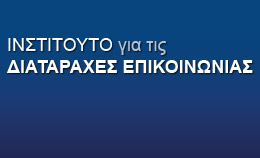INTERNATIONAL FLUENCY ASSOCIATION
3RD WORLD CONGRESS ON FLUENCY DISORDERS
COMBINING STUTTERING THERAPY APPROACHES INTO
AN INTENSIVE GROUP THERAPY COURSE
George C. Fourlas
"logos", Institute for the Disorders of Communication,
9, G. Bakou str., GR-115 24, Athens, Greece.
Tel/fax: +30-1-6916094, e-mail: info@logosinstitute.gr
SUMMARY
An Intensive Group Therapy Course for Greek people who stutter is presented. The course was initially developed in 1994 in Greece, inspired by the intensive courses provided by City Lit Institute, London (Cheasman, 1995). The course has been designed and proposed as an option for therapy for Greek people who stutter. The course combines aspects of Block Modification (VanRiper, 1973) , Avoidance Reduction Therapy (Sheehan, 1975), Personal Construct Psychology (Kelly, 1955), Person Centred Councelling (Rogers, 1961). The initial course has been developed further according to:
- the Clinical experience and the responses of people who stutter to the provided therapy
- the attitudes of Greek people who stutter towards stuttering therapy as these have been expressed and explored during the therapy courses
- cultural issues and issues related to the development of the Speech and Language Therapy profession as well as other clinical professions in Greece
- current perspectives in stuttering therapy
These issues are discussed in relation to the decisions made for change and further development of the course.
The current course is a flexible programme that combines different approaches and techniques into an integrated course that retains the initial theoretical and clinical orientation and principals. The course consists of four phases that may extend over a period of four to twelve months:
- the Preparation phase: It follows an initial interview and consists of individual therapy for those students who either need to work on their stuttering behaviours before they follow the intensive phase or for those who need to work on their attitudes towards stuttering therapy in order to decide which one of the provided therapy options (individual or group therapy) they wish to follow. Only a small number of those who refer themselves for therapy need to go through the preparatory phase. Those People Who Stutter who come to the initial interview under the pressure of others are more likely to start in this phase.
- the Intensive phase: This is the core group therapy course that lasts for two weeks. Approximately 70 hrs of group therapy sessions are provided plus the time that is required by the person who stutters for personal assignments. This is a structured phase that goes through the following stages: group preparation, identification, desensitisation, stuttering modification, change and preparation for generalisation. Although this is a relatively structured course in terms of aims, rational, activities and planning each group is given the flexibility to decide from a pool of activities and techniques that suits individual aims, perspectives and needs. Members of the group are presented with problem solving situations, they are encouraged to explore ideas through experimentation, they share information and experiences, they support each other and they gradually take control over their therapy. Although a �stutter more fluently� approach is adopted members of the group are encouraged to try out �speak more fluently� techniques, especially if they wish to do, as a means of experimentation and reconstruing. At the end of this module students are able to gain control over both stuttering behaviours and the covert features of their stutter, they are able to set up, control and evaluate generalization experiences and to deal with the process of change.
- the Generalisation phase: This phase follows the intensive one. Members of the group work on their own according to a self-designed action plan supported by self-help group meetings. The self-help group consists of members of the current group and members of past groups who wish to take part. The function of this group has been proved extremely important for generalisation and for the transition from depended therapy to self-help therapy. The importance of this self-help group is vital given the lack of a Stuttering Association in Greece.
- Follow up: This takes the form of: a) scheduled group sessions that follow the generalisation phase (obligatory for those who took part in the intensive phase). b) individual therapy sessions following the intensive phase (optional) c) participation in future courses (optional).
Psychotherapy is an option for those students who wish to work on personality issues and can be provided during any of the phases by a specialist who is well informed about the nature and the aims of the course. Extra counseling sessions may also be an option for those who struggle with the changes in their stuttering or they may be part of the preparation phase. Individual therapy is also provided during the intensive phase if necessary.
Clinical paradigms will be discussed with reference to specific phases or stages and videotapes will be played.
References
- Cheasman C., (1995) The City Lit, CSLT Bulletin, 519.
- Kelly,G.A.,(1955) The Psychology of Personal Constructs, New York: Norton.
- Rogers,C.R.(1961) On Becoming a Person. Boston: Houghton Mifflin.
- Sheehan,J.G.,(1975) Conflict Theory and Avoidance-Reduction Therapy. In Eisensen,J.(ed.) Stuttering: A Second Symposium, New York, Harper and Row pp. 97-198.
- Van Riper,C.,(1973) The treatment of Stuttering, , Englewood Cliffs N.J. : Prentice Hall.












